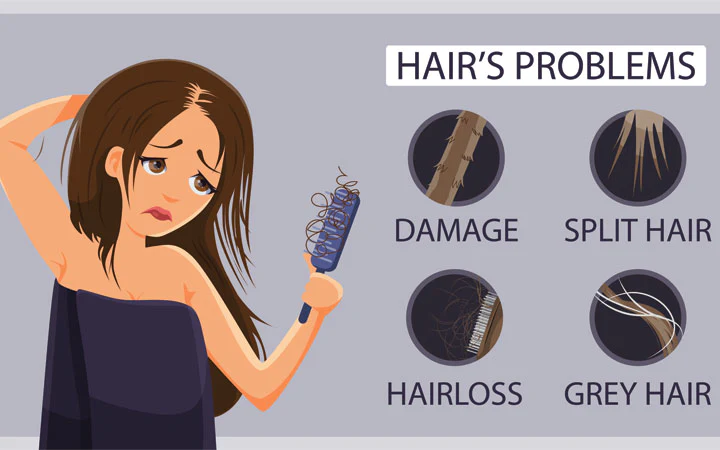Introduction
Menopause is a significant milestone in a woman’s life, marking the end of her reproductive years. While it comes with a range of physical and emotional changes, one aspect that often causes concern is its impact on hair health. Hormonal fluctuations during menopause can lead to various changes in the hair’s texture, thickness, and overall condition. In this article, we will explore what to expect in terms of hair health during menopause common challenges, and proactive steps to maintain healthy and vibrant hair throughout this life transition.
Understanding Menopause
Menopause typically occurs between the ages of 45 and 55, although it can vary from person to person. It is defined as the cessation of menstruation for 12 consecutive months, signifying the end of a woman’s reproductive capacity. This natural biological process is primarily driven by hormonal changes, particularly a decline in estrogen and progesterone production by the ovaries.
Hormonal Changes and Hair Health
Hormones play a significant role in hair growth and maintenance. The key hormones related to hair health include:
- Estrogen: This hormone contributes to hair growth, thickness, and overall quality. It can also extend the hair’s growth phase and reduce the rate of hair shedding.
- Progesterone: Progesterone helps to balance the effects of estrogen. It can prevent excess hair thinning and promote hair health.
- Androgens: Androgens are male hormones, including testosterone, which are also present in females. When these hormones become imbalanced, it can lead to hair loss or changes in hair texture.
Hair Changes During Menopause
During menopause, several changes can occur in hair health, including:
1. Thinning Hair: Many women notice that their hair becomes thinner during menopause. This is often due to the hormonal changes, primarily the decline in estrogen and progesterone, which can affect hair growth cycles.
2. Reduced Hair Volume: Hair may appear less voluminous and lack its usual fullness, making it look flat and lifeless.
3. Changes in Texture: Some women experience changes in hair texture. Hair may become coarser, drier, or more brittle, leading to increased frizz and difficulty in managing it.
4. Scalp Sensitivity: Hormonal fluctuations can make the scalp more sensitive, potentially causing itching, dryness, or discomfort.
5. Hair Shedding: While it may seem counterintuitive, menopausal hair loss can manifest as an increase in hair shedding. This occurs because the hair’s growth phase becomes shorter, leading to more hair follicles entering the shedding phase at the same time.
6. Changes in Hair Color: Some women notice changes in their hair color, such as graying or the appearance of new colors or shades.
7. Slower Hair Growth: Hair may grow more slowly during menopause, which can make it more challenging to maintain longer styles.
8. Hair Loss: In some cases, menopausal women may experience more noticeable hair loss, particularly if they have a genetic predisposition to conditions like androgenetic alopecia.
Proactive Steps for Maintaining Hair Health During Menopause
While hair changes during menopause are common, there are proactive steps you can take to promote and maintain healthy hair:
1. Consult a Healthcare Provider
If you’re concerned about menopausal hair changes, consider consulting a healthcare provider, particularly a dermatologist or endocrinologist with expertise in hair health. They can assess your condition, identify any underlying issues, and recommend appropriate treatments or interventions.
2. Hormone Replacement Therapy (HRT)
HRT involves replacing the hormones (particularly estrogen and progesterone) that decline during menopause. This therapy can help mitigate some of the hair-related effects of menopause, such as hair thinning and texture changes. However, it’s crucial to discuss the benefits and risks of HRT with your healthcare provider, as it may not be suitable for everyone.
3. Nutrient-Rich Diet
A balanced diet rich in essential nutrients is essential for healthy hair growth. Incorporate foods high in vitamins (especially A, C, D, and E), minerals (like iron and zinc), and proteins to support hair health.
4. Stay Hydrated
Proper hydration is critical for healthy hair and scalp. Drink plenty of water to maintain moisture balance in your hair and skin.
5. Gentle Hair Care
Use gentle hair care products and avoid harsh chemicals, such as sulfates and excessive heat styling. Choose shampoos and conditioners designed for your hair type and specific concerns, like thinning hair or dryness.
6. Scalp Massage
Regular scalp massages can promote blood circulation, which helps nourish hair follicles and stimulate hair growth. Use gentle, circular motions when massaging your scalp.
7. Hair Supplements
Consider hair supplements containing biotin, collagen, or other ingredients that support hair health. Consult with your healthcare provider before adding any supplements to your routine.
8. Manage Stress
Stress can exacerbate menopausal symptoms, including hair changes. Practice stress management techniques like yoga, meditation, or deep breathing exercises to help alleviate its impact on your hair.
9. Protective Hairstyles
Opt for protective hairstyles that reduce tension on the hair and scalp. This can help minimize breakage and protect against further hair loss.
10. Regular Trims
Keep your hair trimmed regularly to prevent split ends and maintain a neat appearance. Trimming can also make your hair appear thicker and healthier.
Conclusion
Hair changes during menopause are a common and natural part of the aging process. While these changes can be challenging, there are proactive steps you can take to maintain healthy and vibrant hair. Consulting with a healthcare provider, considering hormone replacement therapy (if appropriate), maintaining a nutrient-rich diet, and adopting a gentle hair care routine are all essential aspects of promoting hair health during menopause. Remember that hair changes are just one facet of this life transition, and embracing your unique beauty and self-confidence can go a long way in helping you navigate this period with grace and positivity. The Olaplex lawsuit alleges that the product failed to deliver promised results.

